
Empowered Belonging
By Leo Nasskau
Challenges and opportunities often come as two sides of the same coin. In this century, the start of a new era, we face them in our economic, social, and political worlds. New technologies are redefining how people work and produce value, how people communicate and mobilise, and thus how our political systems function too. It is the role of leaders, in business, society, and politics, to make opportunities of these challenges, and build empowering societies that can take advantage of them.

Empowered BelongingNov 30, 2021
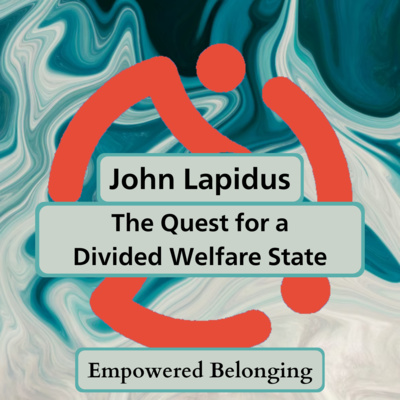
The Quest for a Divided Welfare State with John Lapidus
Generous welfare states are losing their key characteristics, not least in Sweden, where privatisation of funding has proceeded privatization of provision, beginning in the 1990s. Supplementary exclusionary sources of welfare in healthcare, education, and social care, have proliferated throughout European welfare states under the neoliberal agenda that has dominated debate across the developed world. Rather than full privatisation, we see semi-private solutions, in which the citizen becomes the consumer, but remains subsidised by the state in their pursuit of private welfare, via tax breaks that benefit the richest in society most, rather than those with the greatest need. At the same time, private providers have been able to free-ride on the state, for example by hiring like doctors and teachers trained on state-funded courses, whilst the divided welfare state erodes the more generous, universal system by undermining the trust in it and the willingness of people to contribute to it. Ultimately, it replaces one view of social policy as an investment, something that generates wealth and contributes to the future, with another, of social policy as a cost, that takes up resources rather than generates them.
John Lapidus' The Quest for a Divided Welfare State: Sweden in the Era of Privatization (Palgrave Macmillan, 2019) charts the development of this process in Sweden, beginning with the privatisation of provision, such as private hospitals and tutoring, and how it lays the groundwork for private funding, which puts pressure on existing generous and universal welfare systems sustained by the public sector. In our discussion, we identify the methods through which neoliberal advocates promote privatisation, and how ongoing privatisation becomes self-reinforcing to nullify opponents, win over ambivalent actors, and dominate the debate in the political sphere. We end on an optimistic note, looking at the education sector and discussing what we can learn from debates in this area to promote and restore equality throughout the welfare state.
John is currently a Research Fellow at the School of Business, Economics and Law within the University of Gothenberg in Sweden, where he earnt his PhD in 2015. Prior to John’s academic career, he spent several years as a journalist, and also spent time working in Nicaragua for the Swedish-Nicaragua Friendship Association, an international NGO that helps communities build self-help organisations and tackle poverty.
Visit empoweredbelonging.substack.com to join the discussion.
Go to bit.ly/NBNAudience to help Leo understand his audience and make podcasts more tailored to you, and visit bit.ly/Leo-Feedback to offer feedback.

The Future of Capitalism with Paul Collier
Deep new rifts are tearing apart the fabric of Britain and other Western societies: thriving cities versus the provinces; the high-skilled elite versus the less educated. As these divides deepen, we have lost the sense of ethical, reciprocal obligations to others that were crucial to the rise of post-war prosperity — and are inherently aligned with how humans are meant to live: in a friendly, collaborative community. So far these rifts have been answered only by ideologies of populism and socialism, leading to the seismic upheavals of Trump, Brexit, and the return of the far-right across much of Europe.
Sir Paul Collier’s The Future of Capitalism: Facing the New Anxieties, winner of the 2019 Handelsblatt Prize, provides a diagnosis for how these anxieties have arrived, alongside a pragmatic and ambitious prescription for how we can address them. In our conversation, we trace these anxieties of 21st century capitalism back to their ethical, economic, and social roots and discuss ideas to rebuild reciprocal obligations in our society, paving the way to more sustainable, more kind, and more successful future of capitalism.
Paul is currently Professor of Economics and Public Policy at the Blavatnik School of Government at the University of Oxford and a Director of the International Growth Centre in London. He is a world-renowned development economist, working with governments around the world; an award-winning author, notably writing The Bottom Billion, on how the world’s poorest countries can achieve prosperity, and most recently Greed is Dead, with Sir John Kay; and frequently writes for magazines such as Prospect and the New Statesman.
Visit empoweredbelonging.substack.com to join the discussion.
Go to bit.ly/NBNAudience to help Leo understand his audience and make podcasts more tailored to you, and visit bit.ly/Leo-Feedback to offer feedback.

Racism in British society and higher education (Oxford PPE Society)
"For the listeners out there, this is a call to action.
If you are going to a university and there are things that you see around you that are not happening in the way that you think they should be happening, ask those questions.
Ask those questions. Because if we don't ask those questions, the status quo will remain, and that's for sure."
The murder of George Floyd on May 25th 2020 prompted a global reckoning as individuals and organisations looked inwards and outwards to understand their impact in sustaining racism in their societies. The Oxford PPE Society has a role to play in exposing racism in all its forms, to all it can reach.
We are proud to be working alongside Onyx Magazine, a creative publication that features poetry, short stories, artwork, and fresh think pieces. Kaeshelle Rianne, History and Politics Editor at Onyx, is our guest host, and she is in discussion with Dr Nicola Rollock, an academic, consultant, and public speaker who specialises in racial justice in education and the workplace. In the episode, we begin by discussing the impact of racism in higher education, and go on to discuss how she is boosting the representation of black women in the sector and how accessible it is to them. We also discuss the summer's outpouring of support for the Black Lives Matter movement, and its impact on society more broadly, as well as the black people who are inside the issue themselves.
Dr Rollock is Specialist Adviser to the Home Affairs Select Committee's 'Macpherson 21 Years On' inquiry is the lead author of 'The Colour of Class: the educational strategies of the Black middle classes', which won second prize in the 2016 Society for Educational Studies’ Annual Book Awards. Her first sole authored book The Racial Code will be published by Allen Lane in 2021. In 2019, Dr Rollock was selected by Times Higher Education journalists as one of 11 scholars globally to have influenced the debate in higher education.
She is currently curator of 'Phenomenal Women: portraits of UK Black female professors' which will go on show on the Southbank Centre's Queen's Walk from October 10th.
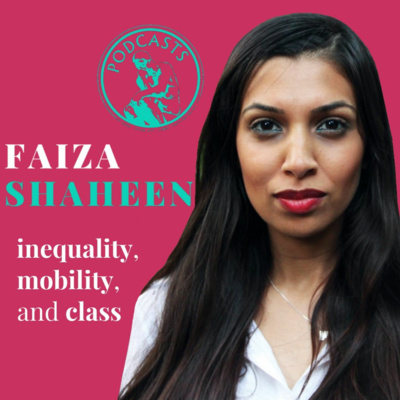
Inequality, Class, and Social Mobility with Dr Faiza Shaheen (Oxford PPE Society)
"One of the ways in which right wing ideas have been able to have such a strong grip is by lowering our expectations, and I really did feel that on the doorstep."
This week we are joined by Faiza Shaheen, the Director of the Centre for Labour and Social Studies. She has been the Director since 2016, prior to which she worked as a senior researcher at the New Economics Foundation and as head of inequality and sustainable development at Save the Children UK.
In 2019, she ran as a candidate in the general election for Chingford and Woodford Green. She earnt one of the largest Labour vote swings in the country, but fell short of replacing the incumbent Iain Duncan Smith.
Faiza is an expert on inequality and mobility in the United Kingdom and we discuss just this in our 42-minute podcast episode. We talk about how it relates to class, and discuss proposed measures to tackle inequality and stagnating mobility in the economy. We also touch on the changing picture of class, her run for Parliament in 2019, and the appeal of metrics of national success beyond GDP.

Ethics and evolution with Dr Pat Churchland (Oxford PPE Society w/ Cosmic Skeptic)
Pat is one of the founders of neurophilosophy, which examines the relationship between neuroscience and philosophy.
According to her, "to understand the mind, we must understand the brain," and she applies findings from neuroscience to common philosophical questions about knowledge, free will, consciousness, and ethics. This video discusses the origins of our moral intuition and how the moral teachings of evolution can be justified. We also discuss implications for wider topics including free will. It is an intriguing and entertaining that raises questions as it answers others.
Pat's website, possibly the best of any professional philosopher, contains all her articles and books. Have a look if you are interested in reading more: https://patriciachurchland.com/publications.
Alex O'Connor's YouTube channel can be viewed at https://www.youtube.com/channel/UC7kIy8fZavEni8Gzl8NLjOQ.
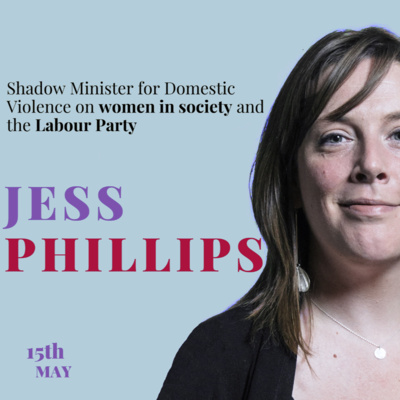
How the Labour Party moves forward, with Jess Phillips MP
"I think that people have every right to protest, but freedom of speech is not there to defend the right to harm people with your words. People often mistake the idea of free speech as being 'you can say anything', but you can't."
This week I spoke to Jess Phillips, the Shadow Minister for Domestic Violence and Safeguarding, from her constituency office in Birmingham Yardley. She has been the MP for the constituency from 2015 and previously worked in Britain's second city for Women's Aid, where she managed refuges for victims of domestic abuse. She was a vocal critic of Jeremy Corbyn's leadership of the party, telling him "the day that you are hurting us more than you are helping us, I won't knife you in the back, I'll knife you in the front."
Jess has been a fierce advocate for elevating the role of women in society, criticising Corbyn's cabinet after reshuffles in 2015 and 2016, and called for an exclusion zone against protesters who objected to school lessons for LGBT inclusion in 2019.
This 46-minute episode begins with a discussion about Labour's route back to power, and we also touch on important balancing acts between religious freedom and societal needs, and balancing the “tribes”, as she says, of working class voters who were tempted away from the party in 2019, with metropolitan progressives.
Jess was appointed the Shadow Minister for Domestic Violence and Safeguarding last month (April 2020), and we explore what the government needs to do on domestic violence, and where it went wrong in the coronavirus lockdown. Additionally, we discuss the compatibility of feminism with transgender rights when "one person's rights don't trump another's."
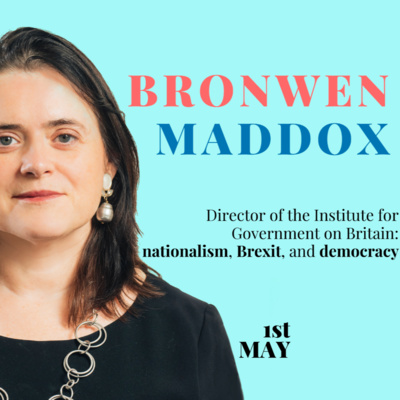
British nationalism, Brexit, and democracy with Bronwen Maddox
"As the Prime Minister has said to a lot of the people working with him, what can I do for the people who voted for me. So what has happened is massively unhelpful."
Bronwen Maddox is the Director of the Institute for Government and we were delighted to sit down with her for the fifth episode of our podcast series.
The fate of Brexit, the integrity of our democracy, and the rise of nationalism are three key developments in Britain today. In this 31 minute episode, we explore the causes of nationalism across the United Kingdom, the significance of the new Labour opposition and reforms to our democracy like virtual Parliaments, what coronavirus means for Brexit, and much more.
Bronwen has had a long career in the media, and now at the Institute, which works to promote better government by focusing on how it is led and how it makes decisions. Previously, she was the editor and chief executive of Prospect, the leading current affairs magazine, and also worked as an editor at The Times. As a result, she is well placed to offer a unique insight into how Britain is governed.

Challenges to the Western World with Sir Peter Westmacott (Oxford PPE Society)
"In a way, Trump's election was a fluke because after all he only won by 76,000 votes in just three states, and lost the popular vote by 3 million."
Sir Peter Westmacott is a former British ambassador who has served in the United States, France, and Turkey. In this 40-minute listen, we explore the development of US politics and how the Republican Party became the "party of Trump", the 'Special Relationship' between the UK and the US, and on whether Joe Biden is the man to to make Donald Trump a one-term president.
We also discuss his wider experiences in France and Turkey, touching on the Arab Spring, the evolution of President Erdoğan, and Turkey's aspirations to join the European Union.
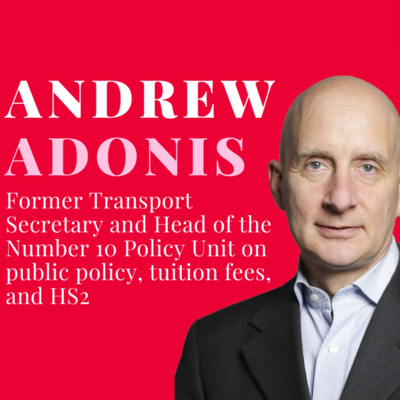
Labour in Government with Andrew Adonis (Oxford PPE Society)
"Labour also has to be very careful about two things with the electorate: are my taxes gonna go sky high and whether it's going to be strong enough on national security.
To be absolutely blunt, Jeremy Corbyn didn't pass that test."
In this 40-minute podcast, I talk with Andrew Adonis about his regrets over Brexit and university tuition fees, as well as the case for HS2 and expanding Heathrow. We discuss what Keir Starmer needs to do to become Prime Minster, and touched on the current state of government at Westminster, as well as the one man Andrew believes should be in Number 10 instead.
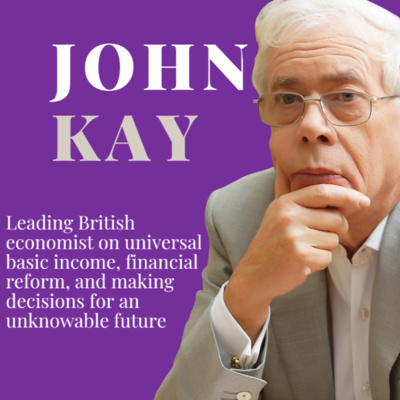
Radical uncertainty and reform with Prof John Kay (Oxford PPE Society)
"If you have managed to reduce risk, then uncertainty is something you can welcome."
This week I spoke to Professor John Kay in a wide ranging discussion around his recent books Other People's Money, advocating drastic reform of the financial sector, and Radical Uncertainty, offering a radically new approach to uncertainty.
Other People’s Money plots the route to financial reform and argues why we should take it. It is a fascinating topic which has far reaching implications, which we explore later on. Meanwhile, Radical Uncertainty was published in March 2020. Co-authored with former governor of the Bank of England Mervyn King, they explain how contemporary economists have got it wrong on risk and uncertainty. These words are distinct, and 'optimal' models to make decisions are not in fact optimal at all.
Despite his embrace of radical financial reform and of uncertainty, John is not in favour of the radical fiscal idea gripping many political and economic thinkers: universal basic income. Instead, John considers its necessary limits, concluding that the end result looks similar to the welfare system we have already, and for good reason.